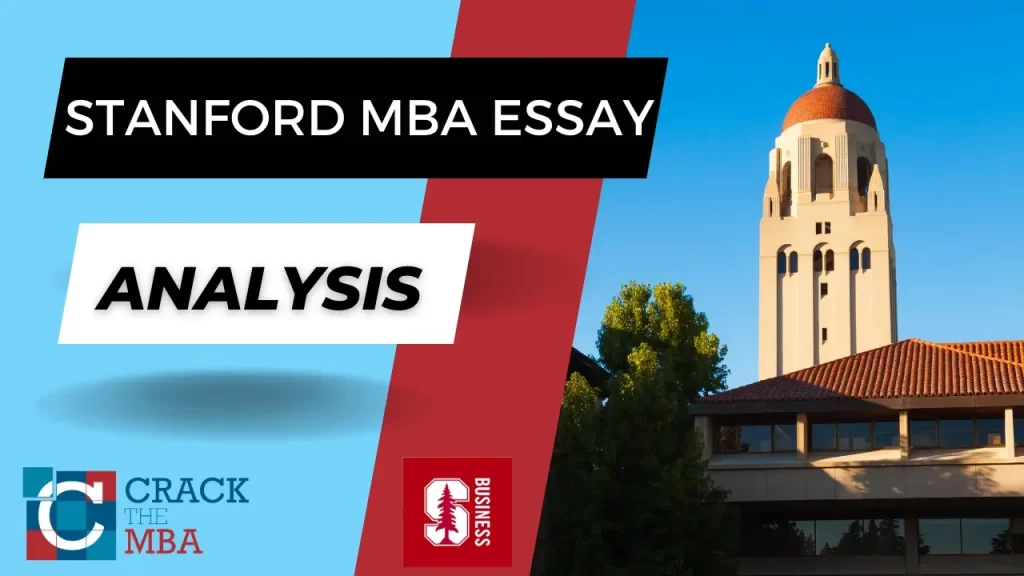Stanford MBA Essay Analysis 2023
Stanford Graduate School of Business is one of the most prestigious MBA programs in the world, attracting thousands of highly qualified applicants each year. To differentiate themselves from other applicants and stand out in the highly competitive admissions process, applicants are required to submit several essays as part of their application. Applicants painstakingly craft these essays to provide the admissions committee with a deeper understanding of their personality, values, experiences, and goals. In this article, we will explore the importance and analysis of the essays asked as part of Stanford’s MBA admissions process. We will discuss the different essay prompts, what the admissions committee is looking for in each essay, and provide tips on how to write strong and compelling essays that will increase your chances of getting accepted to the Stanford Graduate School of Business.

There are two essay prompts that every applicant has to submit and there are a few optional essays.
Below are the essay topics for the 2022-23 application cycle.
Essay A: What matters most to you, and why?
For this essay, we would like you to reflect deeply and write from the heart. Once you’ve identified what matters most to you, help us understand why. You might consider, for example, what makes this so important to you. What people, insights, or experiences have shaped your perspectives?
Essay B: Why Stanford?
Describe your aspirations and how your Stanford GSB experience will help you realize them.
The combined word limit for both essays is 1050 words; 650 words for essay A and 400 words for essay B.
Let’s take a look at both essays.
Stanford MBA Essay Analysis and Tips
Essay A: What matters most to you, and why? (650 words)
The essay topic “What matters most to you, and why?” is a classic and open-ended question that Stanford Graduate School of Business has used for many years. It is a deceptively simple question that requires deep introspection and reflection to answer. The essay is designed to give the admissions committee insight into the applicant’s values, beliefs, and character, and how these have shaped their aspirations and goals.
The prompt encourages applicants to explore their passions, values, and beliefs and how they have influenced their lives. The question is broad enough to allow applicants to choose from a wide range of topics, from personal experiences to philosophical and ethical questions to career aspirations. The essay topic is designed to be open-ended, allowing applicants to express themselves in their own voice and style.
The essay requires applicants to think deeply about what matters most to them, and why. This requires self-reflection and introspection, which can be challenging for some applicants. It is important, to be honest and authentic in the essay, and to avoid falling into the trap of pandering, speculating about what you think the admissions committee wants to hear. The essay is an opportunity for applicants to showcase their unique qualities, values, and aspirations, and to demonstrate their fit with Stanford’s culture and values.
The essay prompt requires applicants to go beyond their resume and academic record and delve into their personal values and beliefs. The essay allows applicants to explain why they have made certain choices in their lives, how they have overcome obstacles, and what motivates them. The essay should provide insight into the applicant’s character, and what drives them to achieve their goals.
The essay prompt is unique because it does not require applicants to provide a specific answer or solution. Rather, it encourages applicants to explore their own personal beliefs and values and how they have influenced their lives. This allows applicants to be creative and express themselves in their own unique way. It is important to remember that there is no right or wrong answer to this essay prompt and that the admissions committee is looking for authenticity and self-reflection.
To write a successful essay on this topic, applicants must first identify what matters most. This can be a daunting task, as it requires honest introspection and self-reflection. Applicants must ask themselves what they care about deeply, what motivates them, and what they believe in.
Here is some actionable advice from Abhi Arora, who is a current second-year student at Stanford GSB.
Once applicants have identified what matters most to them, they must explain why it is important. This is where the essay becomes more challenging, as it requires applicants to articulate their values in a clear and compelling way. This is not an opportunity to write a philosophical treatise or a long-winded autobiography. Instead, it is an opportunity to showcase one’s ability to communicate effectively and express complex ideas in a concise and compelling manner.
The best essays on this topic are those that are both personal and universal. They are personal because they draw on the applicant’s own experiences and values. They are universal because they speak to larger truths that are relevant to everyone.
For example, an applicant might write about their commitment to social justice. They might describe how they have volunteered at a local non-profit organization, worked to raise awareness about important issues, or advocated for change in their community. They might then explain why social justice matters so much to them, drawing on personal experiences, family background, or other factors that have shaped their worldview.
At the same time, they might also make a broader argument about the importance of social justice in society. They might explain how inequality and injustice harm everyone, and how working towards a more just and equitable world benefits everyone, not just the disadvantaged.
Another applicant might write about their passion for entrepreneurship. They might describe how they have started their own business, worked with a startup, or developed innovative ideas in their field. They might then explain why entrepreneurship matters so much to them, drawing on personal experiences, career goals, or other factors that have inspired their interest.
At the same time, they might also make a broader argument about the importance of entrepreneurship in society. They might explain how innovation and creativity drive progress and prosperity, and how entrepreneurship can help solve some of the world’s most pressing problems.
Ultimately, the goal of the “What matters most to you, and why?” essay prompt is to help the admissions committee get to know the applicant as a person. It is an opportunity for applicants to showcase their values, personality, and unique perspective on the world. By writing a thoughtful and compelling essay, applicants can stand out from the crowd and demonstrate their potential to be successful students and future leaders. This is an opportunity for you to convey what makes you tick, how you face adversity, and how you make decisions.
One thing that is crucial in the Stanford application is to be vulnerable. Do not be afraid to talk about your weaknesses or when you failed. As opposed to hiding it under the rug, own up to it and convey how you have grown from the experience. It would serve to show your maturity. It would also reflect the kind of leader you have the potential of being – someone who is not afraid of owning up to her mistakes. This is important as acceptance is the first step in the path to effect change. If a leader remains in denial, it could have devastating consequences for an organization (as we have only too well learned from the experience of Lehman Brothers in the financial crisis of ‘08).
Do you want to get into Stanford GSB?
At Crack The MBA, we have helped hundreds of students get into top MBA programs around the world. We would be happy to help you too. Get in touch with us to learn more about our MBA application services.
Essay B: Why Stanford?
The Stanford MBA admissions essay topic “Why Stanford?” is an important question that requires careful thought and reflection. The essay topic is designed to help the admissions committee understand why an applicant is interested in attending the Stanford Graduate School of Business specifically and how they will contribute to the Stanford community.
The “Why Stanford?” essay should not be a generic statement of interest in attending a top MBA program. Instead, it should be a thoughtful and well-researched response demonstrating a deep understanding of Stanford’s values, culture, and resources. It is important to explain why Stanford is the best fit for the applicant and how they will contribute to the Stanford community. The essay should also show how the applicant’s personal and professional aspirations align with Stanford’s values and how they will benefit from the Stanford MBA program.
One approach to answering the “Why Stanford?” essay question is to focus on the specific resources and programs that Stanford offers. For example, applicants could discuss Stanford’s reputation as a leader in entrepreneurship, innovation, and social impact. They could also highlight specific courses, clubs, or resources that they are interested in, such as the Stanford Venture Studio or the Stanford Social Innovation Review. This approach shows the admissions committee that the applicant has done their research and has a clear understanding of what Stanford can offer them. Of course, the above or any other aspects should be used only as long as they are relevant to your career aspirations. If you have an interest in social impact but are waxing eloquent about Stanford’s entrepreneurial resources, it may be unlikely to sway the admissions committee to the strength of your arguments.
Another approach to answering the “Why Stanford?” essay question is to focus on the values and culture of the Stanford community. Stanford emphasizes collaboration, diversity, and intellectual curiosity, and applicants should demonstrate how they embody these values. They should also highlight their unique perspective and experiences that will contribute to the Stanford community. This approach shows the admissions committee that the applicant is not only a good fit for Stanford but also has the potential to make a positive impact on the Stanford community. It also gives the reader a sense of why the applicant is eager to pursue their MBA education at Stanford.
It is important to note that the “Why Stanford?” essay is not just a reflection of the applicant’s past experiences and achievements, but also a preview of their future aspirations and how they plan to achieve them. Applicants should demonstrate how their career goals align with Stanford’s values and how the Stanford MBA program will help them achieve those goals. This will show the admissions committee that the applicant is not just looking for a top MBA program, but is committed to making a positive impact in their future career and the world.
To do a good job with the essay, it can be useful to do primary research on the school. This means talking to students and alumni and hearing about their experiences. Your first step in identifying prospective touchpoints from the community could be to explore the networks that you are already part of. Explore if someone from your former or current employer or educational institution(s) is or was at Stanford GSB. Explore your LinkedIn network to find any direct or indirect connections with people from Stanford GSB. Be mindful of the academic calendar and the availability of the intended recipient of your message. For example, in the summer post the first year of the MBA program, the odds are that the student would be busy with a summer internship until sometime in August. In December or January during the first year of the MBA program, odds are that the student would be occupied with internship recruiting. Prepare a questionnaire ahead of the call, show up on time, be mindful of the time, and do not abuse the person’s generosity. If your circumstances permit the same, you may also consider visiting the school and attending a class.
In conclusion, the “Why Stanford?” essay topic requires careful thought and reflection. It is important to demonstrate a deep understanding of Stanford’s values, culture, and resources and how they align with the applicant’s career aspirations. The essay should show why Stanford is the best fit for the applicant and how they will contribute to the Stanford community. By doing so, the applicant will demonstrate their potential to make a positive impact in their future career and the world and increase their chances of being admitted to the Stanford Graduate School of Business.
Let’s take a look at the optional essay prompts
Do you want to get into Stanford GSB?
At Crack The MBA, we have helped hundreds of students get into top MBA programs around the world. We would be happy to help you too. Get in touch with us to learn more about our MBA application services.
Stanford MBA Optional essays
In the Essays section of the application, Stanford asks you to share who you are and how you think Stanford will help you achieve your aspirations. The Stanford MBA admissions committee is also interested in learning about the things you have done that are most meaningful to you. If you would like to go beyond your resume to discuss some of your contributions more fully, you are welcome to share up to three examples (up to 1,200 characters, or approximately 200 words, for each example)
What does the admissions committee mean by “optional”? They truly mean you have the opportunity to choose. If you feel that you’ve already described your contributions well in other areas of the application, congratulations, you’re done! If not, feel free to use this opportunity to tell more.
Optional essay analysis
“Think about times you’ve created a positive impact, whether in professional, extracurricular, academic, or other settings. What was your impact? What made it significant to you or to others?” (up to 1,200 characters, or approximately 200 words, for each example – up to three examples)
The optional impact essay questions for Stanford MBA admissions provide an opportunity for applicants to showcase their leadership abilities and highlight their unique experiences and achievements. This essay prompt allows applicants to discuss their contributions in a variety of settings, including professional, extracurricular, academic, or personal contexts.
While this essay is optional, it provides a valuable chance to differentiate oneself from other applicants and highlight one’s unique strengths.
The essay question asks applicants to reflect on specific instances where they have created a positive impact in any setting. This can include professional, academic, or extracurricular experiences. It is important for applicants to provide a detailed description of their impact and the specific actions they took to achieve it. They should also discuss the outcomes of their actions and the extent of the positive impact they had on others.
In addition to describing the impact, the essay question also asks applicants to reflect on what made the experience significant to them or to others. This requires applicants to go beyond just describing the impact and to discuss their personal values, motivations, and goals. For example, an applicant who created a positive impact in a non-profit organization may discuss their passion for social impact and the values that led them to get involved in the organization. This reflection helps the admissions committee understand the applicant’s personal qualities and how they align with Stanford’s values and culture.
If you are wondering about the kind of impact that is good enough to talk about here, this can be an impact on an organization, community, or even an individual. The important part is that this should be meaningful to you. This could even be your support of your family or it could be some contribution in college or at your workplace. The important part is that you should be proud of the accomplishment. If that’s the case, it merits inclusion as part of one of three possible impact essays. Think about how you’ve changed lives, changed organizations, or changed the world. Use that as a guiding force when drafting your responses to this essay.
Overall, the “positive impact” essay question is an opportunity for applicants to showcase their leadership skills, personal values, and accomplishments. It allows them to demonstrate their ability to make a positive difference in the world and to show how their experiences have shaped their personal and professional goals. The essay should be written in a clear and concise manner and should showcase the applicant’s unique perspective and accomplishments. By doing so, applicants can increase their chances of being admitted to the Stanford Graduate School of Business.
Reapplicant essay
The reapplicant essay for Stanford MBA admissions is an opportunity for applicants who have previously applied to the program to update the admissions committee on any changes in their personal or professional life since their last application and to explain how these changes have better prepared them for the MBA program.
When writing the reapplicant essay, you should begin by acknowledging your previous application and explaining what you have been doing since your last application, highlighting any new experiences or accomplishments that have enhanced your profile.
It’s important to focus on substantive changes rather than simply listing additional accomplishments that have occurred since your last application. The admissions committee is looking for applicants who have taken concrete steps to address the weaknesses in their previous application or to enhance their overall profile.
For example, you may have taken additional coursework to strengthen your academic background, taken on a new leadership position at work or in your community, or gained a new perspective on your career goals through conversations with colleagues or mentors.
It’s important to explain how these changes have influenced your decision to reapply to the Stanford MBA program, and how they have better prepared you for the academic rigor and leadership opportunities offered by the program. You should also reflect on how your goals have evolved since your last application and how the Stanford MBA program will help you achieve those goals.
In addition to highlighting changes and progress since your last application, it’s important to address any weaknesses in your previous application. This may include addressing areas where you fell short in your last application, and explaining what you have done to overcome these weaknesses and become a stronger candidate for the Stanford MBA program.
Overall, the reapplicant essay is an opportunity for you to demonstrate your growth and progress since your last application, and to show the admissions committee that you are a stronger and more qualified candidate than before. By being reflective, honest, and specific in your essay, you can increase your chances of being admitted to the Stanford Graduate School of Business.
Final Thoughts
The essays asked as part of the Stanford MBA admissions process are a critical component of the application. They allow applicants to showcase their unique qualities and experiences, and to demonstrate their fit with Stanford’s values and culture. The essays are carefully crafted to provide the admissions committee with a deeper understanding of the applicant’s personality, values, experiences, and goals. By following the tips and guidelines we have discussed in this article, applicants can write strong and compelling essays that will increase their chances of being admitted to the Stanford Graduate School of Business. It is important to remember that essays are just one part of the application and that applicants should also focus on other areas. However, by putting in the time and effort to craft strong essays, applicants can significantly improve their chances of being accepted to the Stanford MBA program, and take the first step towards a successful and rewarding career.
Do you want to get into Stanford GSB?
At Crack The MBA, we have helped hundreds of students get into top MBA programs around the world. We would be happy to help you too. Get in touch with us to learn more about our MBA application services.






